For the 2025 school year, there is 1 public middle school serving 410 students in Portland School District. This district's average middle testing ranking is 6/10, which is in the top 50% of public middle schools in Michigan.
Public Middle School in Portland School District have an average math proficiency score of 26% (versus the Michigan public middle school average of 31%), and reading proficiency score of 45% (versus the 44% statewide average).
Minority enrollment is 9% of the student body (majority Hispanic), which is less than the Michigan public middle school average of 42% (majority Black).
Overview
This School District
This State (MI)
# Schools
4 Schools
1,349 Schools
# Students
1,997 Students
537,315 Students
# Teachers
115 Teachers
31,652 Teachers
Student : Teacher Ratio
17:1
17:1
District Rank
Portland School District, which is ranked within the top 50% of all 851 school districts in Michigan (based off of combined math and reading proficiency testing data) for the 2021-2022 school year.
The school district's graduation rate of 75-79% has decreased from 80-84% over five school years.
Overall District Rank
#296 out of 866 school districts
(Top 50%)
(Top 50%)
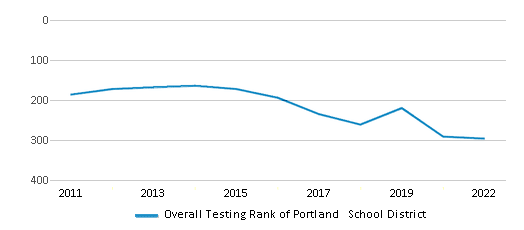
Math Test Scores (% Proficient)
33%
34%
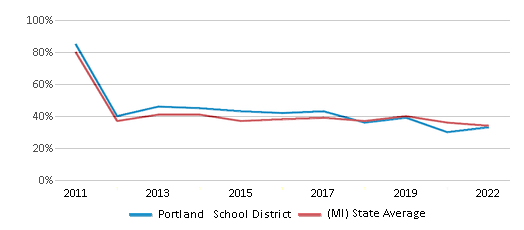
Reading/Language Arts Test Scores (% Proficient)
50%
45%
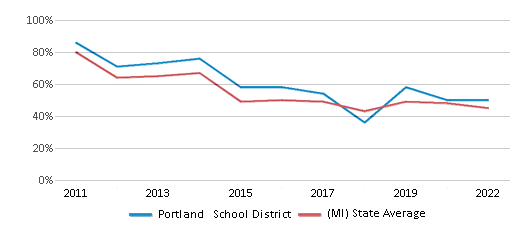
Science Test Scores (% Proficient)
42%
38%
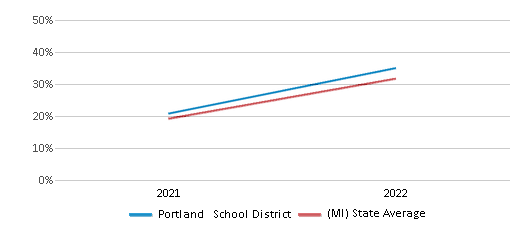
Graduation Rate
75-79%
81%
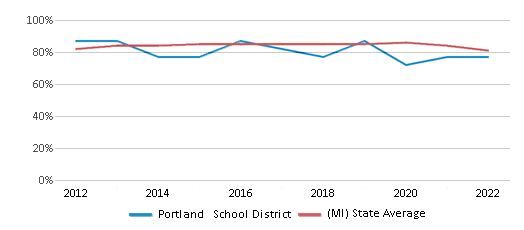
Students by Ethnicity:
Diversity Score
0.16
0.60
# American Indian Students
3 Students
5,345 Students
% American Indian Students
n/a
1%
# Asian Students
8 Students
19,936 Students
% Asian Students
n/a
4%
# Hispanic Students
70 Students
47,905 Students
% Hispanic Students
4%
9%
# Black Students
25 Students
122,970 Students
% Black Students
1%
23%
# White Students
1,832 Students
312,168 Students
% White Students
92%
58%
# Hawaiian Students
n/a
471 Students
% Hawaiian Students
n/a
n/a
# Two or more races Students
59 Students
27,717 Students
% of Two or more races Students
3%
5%
Students by Grade:
# Students in PK Grade:
-
-
# Students in K Grade:
206
17,744
# Students in 1st Grade:
139
17,631
# Students in 2nd Grade:
131
18,045
# Students in 3rd Grade:
147
17,646
# Students in 4th Grade:
134
18,813
# Students in 5th Grade:
142
26,385
# Students in 6th Grade:
145
87,228
# Students in 7th Grade:
124
103,285
# Students in 8th Grade:
141
102,692
# Students in 9th Grade:
156
33,855
# Students in 10th Grade:
165
31,157
# Students in 11th Grade:
175
30,339
# Students in 12th Grade:
192
30,343
# Ungraded Students:
-
2,152
District Revenue and Spending
The revenue/student of $13,902 in this school district is less than the state median of $18,510. The school district revenue/student has stayed relatively flat over four school years.
The school district's spending/student of $14,819 is less than the state median of $17,693. The school district spending/student has stayed relatively flat over four school years.
Total Revenue
$28 MM
$25,476 MM
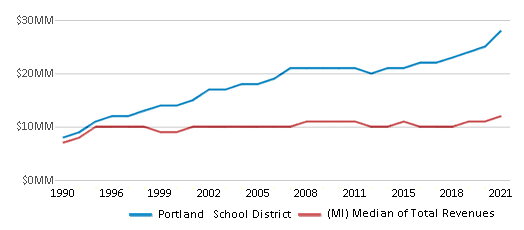
Spending
$30 MM
$24,351 MM
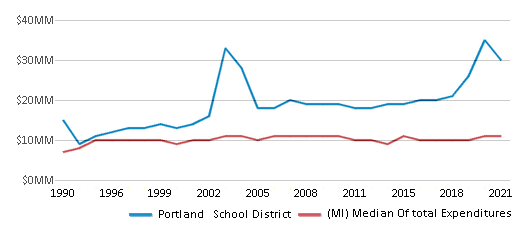
Revenue / Student
$13,902
$18,510
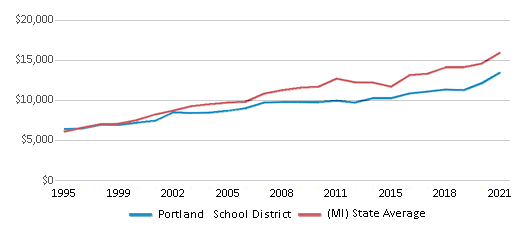
Spending / Student
$14,819
$17,693
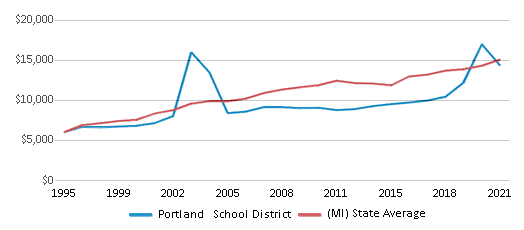
Best Portland School District Public Middle Schools (2025)
School
(Math and Reading Proficiency)
(Math and Reading Proficiency)
Location
Grades
Students
Rank: #11.
Portland Middle School
(Math: 26% | Reading: 45%)
Rank:
Rank:
5/
Bottom 50%10
745 Storz St
Portland, MI 48875
(517) 647-2985
Portland, MI 48875
(517) 647-2985
Grades: 6-8
| 410 students
Recent Articles

Year-Round Or Traditional Schedule?
Which is more appropriate for your child? A year-round attendance schedule or traditional schedule? We look at the pros and cons.

Why You Should Encourage Your Child to Join a Sports Team
Participating in team sports has a great many benefits for children, there is no doubt. In this article you will learn what those benefits are.

White Students are Now the Minority in U.S. Public Schools
Increasing birth rates among immigrant families from Asia and Central and South America, combined with lower birth rates among white families, means that for the first time in history, public school students in the United States are majority-minority. This shift in demographics poses difficulties for schools as they work to accommodate children of varying language abilities and socio-economic backgrounds.





